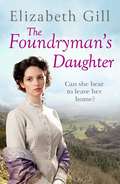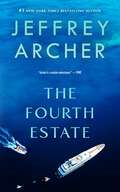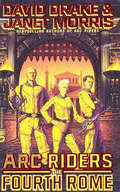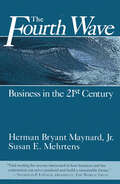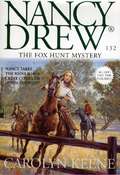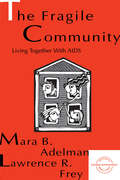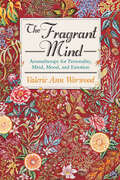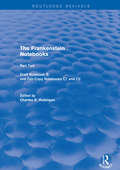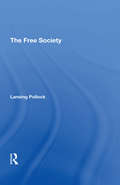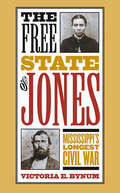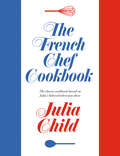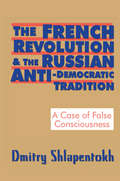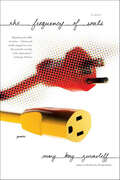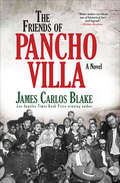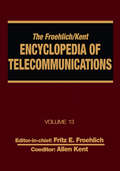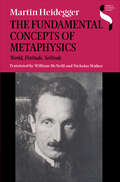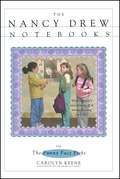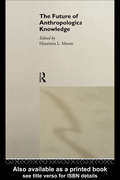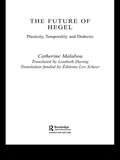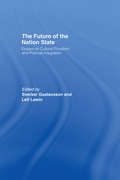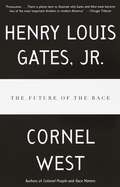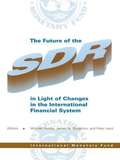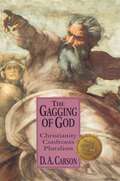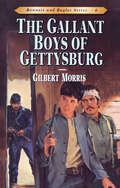- Table View
- List View
The Foundryman's Daughter: Can she bear to leave the place she calls home?
by Elizabeth GillAn emotional saga about the meaning of home from a bestselling author. Perfect for fans of Dilly Court, Maggie Hope and Nadine Dorries.1890, County Durham. Dennes Eliot has worked hard to create a better life for himself. Now a respectable worker at the local Foundry and boarding with his friend Nat, he tries his best to forget his shameful beginnings. But can he really fulfil his dreams in a place where everyone knows his past? Grace Hemingway knows all about the Foundry her father runs, and loves the community built around it. But her parents are grooming her for a stunning London marriage to a man she's not yet met. Can she bear to leave the place she calls home?
The Fourth Estate
by Jeffrey ArcherFrom "one of the top ten storytellers in the world" (Los Angeles Times), Jeffrey Archer's The Fourth Estate sees two power-hungry men prepared to risk everything in a battle to control the largest newspaper empire in the world.Richard Armstrong narrowly escaped Hitler's atrocities in Eastern Europe on his courage and his wits—skills that served him well in peacetime. Having turned a struggling Berlin newspaper into a success story seemingly overnight, Armstrong made a name for himself—and more than a few enemies along the way…Meanwhile, young Keith Townsend enters the international arena, armed with a world-class education and a sense of entitlement to match. Charged with growing his father's newspaper business into a global media force, he and Armstrong are bound to become sworn rivals—until they arrive at the edge of collapse and will do whatever it takes to stay alive in the game…or die trying.
The Fourth Rome (ARC Riders #2)
by David Drake Janet MorrisA Soviet scientific team is performing time travel experiments. They are trying to delay the fall of the Roman Empire so that Russia will be Rome's successor. The ARC Riders must battle these scientists in both the past and the present.
The Fourth Wave: Business in the 21st Century
by Susan E. Mehrtens Herman MaynardApplying the concept of historical waves originally propounded by Alvin Toffler in The Third Wave, Herman Maynard and Susan Mehrtens look toward the next century and foresee a "fourth wave," an era of integration and responsibility far beyond Toffler's revolutionary description of third-wave postindustrial society. Whether we attain this stage of global well-being, however, will depend on how well our business institutions adapt and change. The Fourth Wave examines the ways business has changed in the second and third waves and must continue to change in the fourth. The changes concern the basics-how an institution is organized, how it defines wealth, how it relates to surrounding communities, how it responds to environmental needs, and how it takes part in the political process. Maynard and Mehrtens foresee a radically different future in which business principles, concern for the environment, personal integrity, and spiritual values are integrated. The authors also demonstrate the need for a new kind of leadership-managers and CEOs who embrace an attitude of global stewardship; who define their assets as ideas, information, creativity, and vision; and who strive for seamless boundaries between work and private lives for all employees.
The Fox Hunt Mystery (Nancy Drew Mystery Stories #132)
by Carolyn KeeneIn pursuit of a horse thief, Nancy rides down a twisted trail of trouble! Nancy's friend Laura Passano has invited her down to Maryland to enjoy a horseback riding holiday. The weather is wonderful, the pastures peaceful, the trip a real treat. There's only one catch: Someone's out to sabotage the Passano family stables. First, the feed is poisoned ...then Laura's favorite horse, Morning Glory, is stolen! Did Alexa Shaw, Laura's spoiled rival, find the perfect way to hurt her? Or has the upcoming fox hunt so enraged animal activists that they've turned to sabotage? Spurred to action, Nancy's in the hunt for a lawbreaker ... and she's headed straight into a hornet's nest of greed, jealousy, deception, and dangerous secrets!
The Fragile Community: Living Together With Aids (Everyday Communication Ser.)
by Larry R. Frey Mara B. AdelmanThis book examines the concept of "community," focusing on how communication practices help manage the tensions of creating and sustaining everyday communal life amidst the crisis of human loss. While acknowledging how the contradictory and inconsistent nature of human relationships inevitably affects community, this intimate and compelling text shows how community is created and sustained in concrete communication practices. The authors explore these ideas at Bonaventure House, an award-winning residential facility for people with AIDS, where the web of social relationships and the demands of a life-threatening illness intersect in complex ways. Facing a life-threatening illness can defy meaningful social connections, but it can also inspire such ties, sometimes in ways that elude us in the course of daily life. By understanding how collective communication practices help residents forge a sense of community out of the fragility and chaos of living together with AIDS, we are able to better understand how communication is inexorably intertwined with the formation of community in other environments. Based on seven years of ethnographic research including participant-observation, in-depth interviews, and questionnaires, this book weaves together narratives and visual images with conceptual analysis to uncover the ongoing oppositional forces of community life, and to show how both mundane and profound communication processes ameliorate these tensions, and thereby sustain this fragile community. Because the average length of stay for a resident is seven months -- in which time he or she moves from being a newcomer to a community member to someone the community remembers -- the text reflects this short, but crystallized life, starting with the day a new resident opens the door to the day he or she passes away. The writing is rich -- intimate, engaging, personal, compelling, and vivid. The stories told discuss such deeply personal topics as the dilemmas of romantic relationships in a context fraught with many perils; issues of power, authority, and control that enable and constrain social life; and communicative practices that help residents cope with bereavement over the loss of others as well as their own impending deaths. The text concludes by examining the lessons learned from Bonaventure House about creating and sustaining a health community, and serves as an inspiration for strengthening interpersonal relationships and communities in other environments.
The Fragrant Mind: Aromatherapy for Personality, Mind, Mood and Emotion
by Valerie Ann WorwoodThe Fragrant Mind is written in an easy, accessible style for anyone who wishes to learn how essential oils can influence our minds and emotions and how to use aromatherapy to maintain a peaceful equilibrium or bring about positive change. Valerie Worwood's The Complete Book of Essential Oils and Aromatherapy (over 200,000 copies sold) has become the encyclopedia of essential oils and aromatherapy, earning itself the status of a popular household and reference classic. In this companion volume, Worwood concentrates on the emotional, psychological, and mood-changing effects of nature's oils.
The Frankenstein Notebooks: Part Two Draft Notebook B And Fair-copy Notebooks C1 And C2 (Routledge Revivals: The Frankenstein Notebooks Ser. #1)
by Charles E. RobinsonMary Shelley’s Frankenstein is arguably the best known work of the English Romantic period. First published in 1996, this edition of The Frankenstein Notebooks contains not only facsimiles and transcriptions of all of surviving manuscripts related to the novel and a corrected, critical text of Frankenstein (or The Modern Prometheus) but also a full range of factual information, drawn from Shelley’s and William Godwin’s letters and journals, from newspaper ads of the day, and from other available scholarship about the conception, gestation, and birth of Mary Shelley’s monster. This two volume set contains a wealth of information vital to the creation and reception of Frankenstein. It will enable scholars, critics and students to see for themselves the exact extent of P. B. Shelley’s editorial contributions and trace the artistic and ideological development of the novel at various stages in its formation. It will also enable the reader to explore the text itself to test and evaluate their own theses. Part two contains the draft notebook B, which was written between December 1816 and April 1817, and the fair-copy notebooks which were compiled between April and May 1817.This set will be of keen interest to those studying Frankenstein, the Romantics and 19th century literature.
The Free Society
by Lansing PollockIn the tradition of Milton Friedman’s 1962 classic, Capitalism and Freedom, Lansing Pollock draws on moral, political, and economic theory to defend a libertarian vision of the good society. Pollock argues that mutual consent, derived from a fundamental Kantian moral equality, is the ideal standard for judging relations between persons. He contends that if the equal right of all persons to be free is taken seriously, most of the coercion by government that many take for granted is immoral. Pollock situates libertarian moral theory in an American historical context, one compatible with the views of James Madison and Thomas Jefferson. Pollock argues that when the Constitution is interpreted according to the political philosophy of the framers, the modern welfare state is unconstitutional. Pollock goes on to demonstrate how free market economies promote human well-being, whereas government regulation is often counterproductive. In advocating a reduction in the size and scope of government, Pollock includes applied policy analyses of poverty and health care, among other topical issues. He also offers an innovative solution to the problem of funding a limited government without violating individual rights. The strength of The Free Society lies in its synthetic achievement. In a book that is accessibly written and sure to appeal to scholar and lay reader alike, Pollock provides a compelling conception of the good society—one in which the libertarian vision includes moral, social, political, and economic perspectives.
The Free State of Jones
by Victoria E. BynumBetween late 1863 and mid-1864, an armed band of Confederate deserters battled Confederate cavalry in the Piney Woods region of Jones County, Mississippi. Calling themselves the Knight Company after their captain, Newton Knight, they set up headquarters in the swamps of the Leaf River, where, legend has it, they declared the Free State of Jones. The story of the Jones County rebellion is well known among Mississippians, and debate over whether the county actually seceded from the state during the war has smoldered for more than a century. Adding further controversy to the legend is the story of Newt Knight's interracial romance with his wartime accomplice, Rachel, a slave. From their relationship there developed a mixed-race community that endured long after the Civil War had ended, and the ambiguous racial identity of their descendants confounded the rules of segregated Mississippi well into the twentieth century.Victoria Bynum traces the origins and legacy of the Jones County uprising from the American Revolution to the modern civil rights movement. In bridging the gap between the legendary and the real Free State of Jones, she shows how the legend--what was told, what was embellished, and what was left out--reveals a great deal about the South's transition from slavery to segregation; the racial, gender, and class politics of the period; and the contingent nature of history and memory."An original and cogent piece of scholarship on a devilishly complicated and demanding subject."--Washington Times"Bynum deserves much praise for her ability to negotiate the minefield of myth and legend to produce a study that not only makes a tremendous contribution to scholarship but is a compelling read as well. Thoroughly researched, thoughtfully argued, well-written, and unfailingly interesting, Bynum's work further demonstrates the potential of local studies to shed light on broader forces that have shaped the American past."--H-Net"Bynum has fashioned frustratingly disparate material into an important book that may cause historians who are skeptical about putting too much stress on an 'inner' Civil War to rethink their position."--American Historical Review"Powerful, revisionist, and timely, Bynum's book combines superb history with poignant analysis of historical memory and southern racial mores."--ChoicePiercing through the myths that have shrouded the "Free State of Jones," Victoria Bynum uncovers the fascinating true history of this Mississippi Unionist stronghold, widely believed to have seceded from the Confederacy, and the mixed-race community that evolved there. She shows how the legend--what was told, what was embellished, and what was left out--reveals a great deal about the South's transition from slavery to segregation; the racial, gender, and class politics of the period; and the contingent nature of history and memory.-->
The French Chef Cookbook
by Julia ChildThe beloved icon and author of best-selling classic Mastering the Art of French Cooking presents an array of delectable French recipes that first made her a household name. Originally debuted on her first public television show, here are 119 traditional French recipes, tested and perfected for home cooks to enjoy—from Mayonnaise to Bouillabaisse, crepes to steaks, and delicious vegetables to delectable desserts. America&’s first lady of food continues to profoundly shaped the way we cook, the way we eat, and the way we see food.
The French Revolution and the Russian Anti-Democratic Tradition: A Case of False Consciousness
by Dmitry ShlapentokhThe political uncertainty following the collapse of the Soviet Union and the rejection of the revolutionary model has brought Russian political thought full circle as democratic forces contend with authoritarian nationalism. This volume is essential to understanding the antidemocratic tradition in Russia and the persistent danger of totalitarianism.
The Frequency of Souls: A Novel
by Mary Kay ZuravleffA staid refrigerator designer's life is changed by a quirky, spiritual female colleague who is obsessed with finding electrical evidence of life after death in this extraordianry debut novel.
The Friends of Pancho Villa: A Novel
by James Carlos BlakeWith his debut novel on legendary Texas outlaw John Wesley Hardin, The Pistoleer, James Carlos Blake demonstrated a rare talent for western and historical fiction. His second book, The Friends of Pancho Villa, now back in print, further proved his mastery in the genre, taking on an even mightier figure of North American legend—the most memorable leader of the Mexican Revolution. Violently waged from 1910 to 1920, the revolution profoundly transformed Mexican government and culture. And Pancho Villa was its “incarnation and its eagle of a soul”—so says Rodolfo Fierro, the novel’s narrator, an ex-con, train robber, and Villa’s loyal friend. Killers of men and lovers of life, the revolutionaries fought for freedom, for a new Mexico, for Villa. And in return, they shared victory and death with their country’s most powerful hero. The Friends of Pancho Villa is a masterpiece of ferocious loyalty, bloody revolution, and legends that live forever.
The Froehlich/Kent Encyclopedia of Telecommunications: Volume 13 - Network-Management Technologies to NYNEX
by Allen Kent Fritz E. FroehlichThis article reviews network-management problems, technologies and standards, outlining the problems and challenges of the field. It overviews the functions and architectures, of various components of network-management systems (NMSs), describing key network-management application areas.
The Fundamental Concepts of Metaphysics: World, Finitude, Solitude (Studies in Continental Thought)
by Martin Heidegger" . . an important addition to the translations of Heidegger's lecture-courses . . Heidegger's voice can be heard with few of the jolting Germanicisms with which so many translations of Heidegger's texts have been burdened. . . ." —International Philosophical Quarterly"The translators of these lectures have succeeded splendidly in giving readers an intimation of the tensely insistent tone of the original German. Heidegger's concern with a linguistic preconsciousness and with our entrancement before the enigma of existence remains intensely contemporary." —Choice"There is much that is new and valuable in this book, and McNeill and Walker's faithful translation makes it very accessible." —Review of Metaphysics"Whoever thought that Heidegger . . . has no surprises left in him had better read this volume. If its rhetoric is 'hard and heavy' its thought is even harder and essentially more daring than Heideggerians ever imagined Heidegger could be." —David Farrell KrellFirst published in German in 1938 as volume 29/30 of Heidegger's collected works, The Fundamental Concepts of Metaphysics includes an extended treatment of the history of metaphysics and an elaboration of a philosophy of life and nature. Heidegger's concepts of organism, animal behavior, and environment are uniquely developed and defined with intensity.This work, the text of Martin Heidegger's lecture course of 1929/30, is crucial for an understanding of Heidegger's transition from the major work of his early years, Being and Time, to his later preoccupations with language, truth, and history. First published in German in 1983 as volume 29/30 of Heidegger's collected works, The Fundamental Concepts of Metaphysics includes an extended treatment of the history of metaphysics and an elaboration of a philosophy of life and nature. Heidegger's concepts of organism, animal behavior, and environment are uniquely developed and defined with intensity.
The Funny Face Fight (Nancy Drew Notebooks #14)
by Carolyn KeeneA FUNNY FACE IS NO JOKE! The race is on for president of Nancy's class, and three kids are in the running: Vicki Wolf, Jessie Shapiro, and Mike Minelli. But taking sides seems to mean making enemies, and now someone's playing dirty. Who put the silly mustache on the campaign poster? Nancy has to find out before election day because everybody's getting upset . . . and if everybody's mad, nobody wins!
The Future of Anthropological Knowledge (ASA Decennial Conference Series: The Uses of Knowledge)
by Henrietta L. MooreThe Future of Anthropological Knowledge the chapters explore the question of the nature of social knowledge from a variety of perspectives and locations such as China, Africa, the USA and elsewhere. By examining the changing nature of anthropological knowledge and of the production of that knowledge, this book challenges the notion that only western societies have produced social theories of modernity and of global scope. Knowledge of society can no longer be restricted to a knowledge of face-to-face social relations but must encompass the effect of technology, global consumption patterns and changing geo-political configurations. The Future of Anthropological Knowledge will be of interest to anthropologists and students of culture and society.
The Future of Hegel: Plasticity, Temporality and Dialectic
by Catherine MalabouThis book is one of the most important recent books on Hegel, a philosopher who has had a crucial impact on the shape of continental philosophy. Published here in English for the first time, it includes a substantial preface by Jacques Derrida in which he explores the themes and conclusions of Malabou's book. The Future of Hegel: Plasticity, Temporality and Dialectic restores Hegel's rich and complex concepts of time and temporality to contemporary philosophy. It examines his concept of time, relating it to perennial topics in philosophy such as substance, accident and the identity of the subject. Catherine Malabou's also contrasts her account of Hegelian temporality with the interpretation given by Heidegger in Being and Time, arguing that it is the concept of 'plasticity' that best describes Hegel's theory of temporality. The future is understood not simply as a moment in time, but as something malleable and constantly open to change through our interpretation. The book also develops Hegel's preoccupation with the history of Greek thought and Christianity and explores the role of theology in his thought.Essential reading for those interested in Hegel and contemporary continental philosophy, The Future of Hegel is also fascinating to those interested in the ideas of Heidegger and Derrida.
The Future of the Nation-State: Essays on Cultural Pluralism and Political Integration (Routledge Advances in International Political Economy #No. 1)
by Sverker Gustavsson Leif LewinThe tension between culture, politics and economy has become one the dominant anxieties of modern society. On the one hand people endeavour to maintain and develop their cultural identity; on the other there are many forces for international integration. How to understand and explain this fundamental issue is illuminated in nine essays by eminent scholars.
The Future of the Race
by Cornel West Henry Louis GatesAlmost one-hundred years ago, W.E.B. Du Bois proposed the notion of the "talented tenth," an African American elite that would serve as leaders and models for the larger black community. In this unprecedented collaboration, Henry Louis Gates, Jr., and Cornel West--two of Du Bois's most prominent intellectual descendants--reassess that relationship and its implications for the future of black Americans. If the 1990s are the best of times for the heirs of the Talented Tenth, they are unquestionably worse for the growing black underclass. As they examine the origins of this widening gulf and propose solutions for it, Gates and West combine memoir and biography, social analysis and cultural survey into a book that is incisive and compassionate, cautionary and deeply stirring.
The Future of the SDR in Light of Changes in the International Financial System
by Michael Mussa#"Proceedings of a seminar held in Washington, D. C. , March 18-19, 1996. "#Includes bibliographical references.
The Gagging of God: Christianity Confronts Pluralism
by D. A. CarsonThe Gold Medallion Award-winning book that presents a persuasive case for Christ as the only way to God. Is Jesus the only way to God? This clear, critically-acclaimed, scholarly response to that question affirms the deep need for the Gospel’s exclusive message in today’s increasingly pluralistic global community. The Gagging of God offers an in-depth look at the big picture, shows how the many ramifications of pluralism are all parts of a whole, and then provides a systematic Christian response.
The Gallant Boys of Gettysburg (Bonnets and Bugles #6)
by Gilbert MorrisLeah&’s sister Sarah is on her way to that quaint little Pennsylvania town of Gettysburg to help out an old friend. Tom, who is Jeff&’s brother and the soldier Sarah loves, is also headed to Gettysburg, but with the Army of Northern Virginia. Neither of them know that the Northern and Southern troops are about to clash at peaceful little Gettysburg in the bloodiest battle of the Civil War. As Tom fights his way into town, he sees a girl running, threatened by the deadly shells, and is shocked to recognize her as Sarah. Share their fears, their heartbreak. Learn what they learn--that God is with His people even when life gets rough.The Gallant Boys of Gettysburg is the sixth of a ten book series, that tells the story of two close families find themselves on different sides of the Civil War after the fall of Fort Sumter in April 1861. Thirteen year old Leah becomes a helper in the Union army with her father, who hopes to distribute Bibles to the troops. Fourteen year old Jeff becomes a drummer boy in the Confederate Army and struggles with faith while experiencing personal hardship and tragedy. The series follows Leah, Jeff, family, and friends, as they experience hope and God&’s grace through four years of war.
The Gallant Boys of Gettysburg (Bonnets and Bugles #6)
by Gilbert MorrisLeah&’s sister Sarah is on her way to that quaint little Pennsylvania town of Gettysburg to help out an old friend. Tom, who is Jeff&’s brother and the soldier Sarah loves, is also headed to Gettysburg, but with the Army of Northern Virginia. Neither of them know that the Northern and Southern troops are about to clash at peaceful little Gettysburg in the bloodiest battle of the Civil War. As Tom fights his way into town, he sees a girl running, threatened by the deadly shells, and is shocked to recognize her as Sarah. Share their fears, their heartbreak. Learn what they learn--that God is with His people even when life gets rough.The Gallant Boys of Gettysburg is the sixth of a ten book series, that tells the story of two close families find themselves on different sides of the Civil War after the fall of Fort Sumter in April 1861. Thirteen year old Leah becomes a helper in the Union army with her father, who hopes to distribute Bibles to the troops. Fourteen year old Jeff becomes a drummer boy in the Confederate Army and struggles with faith while experiencing personal hardship and tragedy. The series follows Leah, Jeff, family, and friends, as they experience hope and God&’s grace through four years of war.
